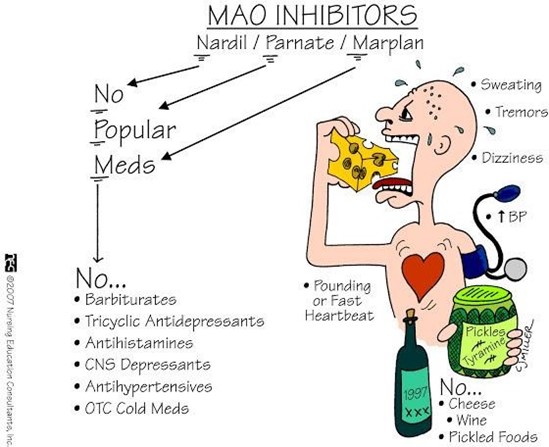A nurse is collecting data from a client who is taking tranylcypromine and reports ingestion of tyramine-rich foods.
The nurse should monitor the client for which of the following findings as an adverse effect of this medication?
Hyperglycemia
Hypertension
Hematuria,
Tinnitus
The Correct Answer is B
Explanation
B.Hypertension
Tranylcypromine is a monoamine oxidase inhibitor (MAOI) used to treat depression. One of the potential adverse effects of MAOIs is hypertensive crisis, which can be triggered by the consumption of foods high in tyramine. Tyramine-rich foods, such as aged cheeses, cured meats, certain wines, and fermented products, can cause the release of norepinephrine, leading to a sudden increase in blood pressure.
Monitoring the client for hypertension is crucial because a hypertensive crisis can be life-threatening. Signs and symptoms of hypertensive crisis may include severe headache, chest pain, palpitations, blurred vision, anxiety, and shortness of breath. If these symptoms occur, immediate medical intervention is required.
The other options are not specifically associated with the adverse effects of tranylcypromine:
Hyperglycemia in (option A) is not typically associated with tranylcypromine. However, it is important to monitor blood glucose levels in clients with pre-existing diabetes, as tranylcypromine can affect blood sugar control.
Hematuria (blood in the urine) in (option C) is not a common adverse effect of tranylcypromine.
Tinnitus (ringing in the ears) in (option D) is not a commonly reported adverse effect of tranylcypromine.

Nursing Test Bank
Naxlex Comprehensive Predictor Exams
Related Questions
Correct Answer is C
Explanation
Overhearing a discussion about a client's private information is a breach of confidentiality, and it is the nurse's responsibility to address the situation promptly.
While documenting the event in the client's progress notes might be necessary in some cases, it is not the initial action to take in this scenario. Similarly, submitting an incident report to the risk manager may be required for documentation purposes, but it is not the immediate action to address the breach of confidentiality.
Informing the client of the APs' actions may not be necessary unless there is evidence that the client's privacy has been compromised or if the client specifically requests to know. However, the priority is to address the issue of the conversation between the APs and ensure that confidentiality is maintained.
Correct Answer is D
Explanation
A.The prescription specifies “four times per day,” which is clear.
B.The medication specified is erythromycin, which is clear
C.The dosage of 500 mg is clearly specified.
D.The route of administration eg. oral, topical is not specified and needs to be clarified to ensure proper administration.
Whether you are a student looking to ace your exams or a practicing nurse seeking to enhance your expertise , our nursing education contents will empower you with the confidence and competence to make a difference in the lives of patients and become a respected leader in the healthcare field.
Visit Naxlex, invest in your future and unlock endless possibilities with our unparalleled nursing education contents today
Report Wrong Answer on the Current Question
Do you disagree with the answer? If yes, what is your expected answer? Explain.
Kindly be descriptive with the issue you are facing.
